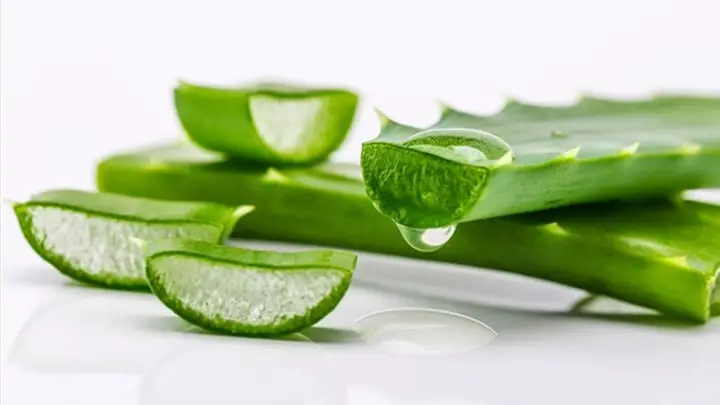Aloe vera is a hydrating formula that is very popular in the skincare world for its soothing effects on the skin. The plant works effectively for internal and external skin and hair concerns. You can use aloe vera for skin conditions like eczema, dandruff, and inflammation.
Asides from working as a natural moisturizer, the hydrating formula also contains antibacterial properties that can help to fight off infections caused by bacteria on the skin.
Eczema is a common skin condition that causes the skin to become itchy and dry. This skin condition, also known as atopic dermatitis, can develop due to allergens and free radicals from the environment.
Read ahead to find out how aloe vera may help improve eczema, why you should use it, and how to use it on your skin correctly.
SEE: Aloe Vera as Moisturizer- Benefits, Risks, and How to Apply Properly
Can You Use Aloe Vera for Eczema?
There are no scientific backings or research that confirms the effectiveness of aloe vera when it comes to eczema. However, several people with skin conditions turn to natural remedies like aloe vera to help treat the symptoms.
Eczema causes the skin to become dry and itchy and those effects can be treated with an aloe gel. The hydrating formula contains anti-inflammatory properties that can help to reduce and soothe the itchiness and redness of the skin. Likewise, the hydrating effect of aloe vera can help to eliminate dry skin.
Some reviews confirm the effects of the aloe plant in treating skin dryness and itchiness. Since dryness and itchiness are the two symptoms of eczema, it is safe to say aloe vera can help to treat eczema.
A review confirms the effectiveness of aloe vera in improving health. The researchers of the review confirm that the hydrating plant contains antibacterial and anti-inflammatory properties that can help to protect the skin from infections and the irritations that come with it.
According to another study, aloe plant contains properties that are beneficial in treating symptoms of eczema such as inflammation, itchiness, dryness, and redness.
Eczema can cause the skin to break and peel, which gives room for infections to develop. The antibacterial effects of aloe vera can help to prevent and fight skin infection.
What Are the Benefits of Using Aloe Vera for Eczema?
Aloe vera contains moisturizing, antibacterial, antifungal, and anti-inflammatory properties that can help to restore the skin’s health.
Inflammations from eczema on the skin can put your skin at risk of infections. Aloe vera contains properties that can prevent that from happening.
As you treat your eczema with aloe gel, your skin will benefit in other ways. Aloe gel may help to boost your immune system as it contains antioxidant properties that help to protect the skin from damage.
The gel can also help your skin heal faster than usual, as it contains polysaccharides—an enzyme responsible for promoting skin growth to aid healing.
Aloe gel also works as a natural hydrator that helps to moisturize and prevent water loss in the skin. Applying aloe gel on your skin will also help to reduce redness, inflammation, and curb infections.
How to Use Aloe Vera for Eczema
Purchase an aloe gel from a beauty store or extract some from an aloe plant. After you have gotten the hydrating gel, apply it to a small area of your skin to check for allergic reactions. Wait for 24 hours after applying the gel to a small part of your skin.
If you do not experience any irritation or contact dermatitis—which is the most common allergic reaction to aloe vera—you can use the gel on your skin. But if you notice any irritation, desist from using aloe on your skin.
Below are steps to apply aloe vera to your skin to treat eczema.
Step 1: Wash your skin
Start by removing dirt from the surface of your skin by cleansing it with a gentle soap that doesn’t contain fragrance. Wash your skin with water to rinse off the cleanser.
Step 2: Use the aloe gel
Apply your aloe gel on affected areas of your skin after the cleansing process. The natural hydrator will moisture and prevent dryness on your skin. You can apply the treatment on your skin as often as twice every day.
Step 3: Proceed to your everyday routine
You can move on to apply your serum, oils, and every other skincare product you use in your normal routine. If you are someone that only uses a three-step routine—cleanse-tone-moisture, after applying your aloe vera gel, you can look for other natural skincare products to use in your routine.
For your toner, you can use one that contains antibacterial and anti-inflammatory properties to help reduce eczema. You can use a moisturizer that contains rose water to give your skin the right hydrating boost.
SEE: Health Benefits of Aloe Vera That Makes It the Wonder Plant
Can You Use Aloe Vera for a Baby’s Eczema?
Even though a baby’s skin is sensitive and often reacts harshly to topical treatments, you can apply aloe gel as a treatment for a baby’s eczema.
Babies often get infections and skin conditions because of the sensitivity of their skin. An example of dermatitis for babies is diaper rash.
A study reveals that an ointment that contains aloe vera can help to relieve diaper rash. Another study confirms that applying aloe gel topically to the skin persistently can help to relieve and heal rashes on the skin.
Researchers also revealed that none of the participants experienced side effects or harsh reactions on their skin. This shows that aloe vera is safe for a baby’s skin and can be used for eczema. The hydrating formula will help to soothe redness and irritation on the skin.
Can You Use Aloe Vera for Dermatitis on the Scalp?
Dermatitis on the scalp is known as dandruff. You can use aloe vera to treat seborrheic dermatitis, a skin condition that causes dandruff to develop on the scalp.
A study reveals that aloe vera gel helps to reduce itching, peeling, and dandruff on the scalp. The researchers found that using aloe vera can significantly help to reduce dermatitis on the scalp.
Another study reveals that aloe works effectively to reduce the symptoms of dermatitis while there was no record of harsh reaction to the treatment.
Aside from dermatitis treatment, you can use aloe vera as a hair gel to replenish your strand and moisturize your natural hair.
What Can You Use With Aloe Vera for Eczema?
There are several natural home ingredients that you can mix with aloe vera to treat eczema. Below are some of them and how to use them with aloe gel.
1. Turmeric
According to a study, turmeric contains a compound called curcumin—that has anti-inflammatory and antioxidant properties. These properties make turmeric a useful ingredient in eczema treatment. Below are the steps to use turmeric with aloe gel.
How to use it:
- Add a tablespoon of aloe vera gel into a bowl
- Mix the gel with a pea-sized amount of turmeric
- Apply and massage the mixture on the affected areas of your skin
- Allow the treatment to sit on your skin for 30 minutes
- Wash the treatment off with clean water and a cleanser
- Moisturize your skin with a gentle moisturizer
2. Honey
Honey contains antibacterial and anti-inflammatory properties that help with wound healing. A review confirms that applying honey to your skin will help to treat skin concerns like burns and itchiness.
Asides from its anti-inflammatory properties, it contains antibacterial properties that can help to fight off infections.
How to use it:
- You can apply aloe vera first on your skin, followed by honey.
- You can also mix honey and aloe vera in a bowl
- Apply the mixture to your skin
- Allow it to sit for a few minutes before washing it off
3. Coconut oil
The high content of fatty acids in coconut oil gives off the moisturizing effects when you apply it to this skin. This can help to reduce the symptoms of eczema on the skin. It also contains anti-inflammatory properties that can help to soothe skin itchiness.
A study confirms that pure coconut oil can help to improve the symptoms of eczema in just 8 weeks of using the treatment
How to use it:
- Add 1/3 cup of aloe vera to a bowl
- Add 1/2 cup of coconut oil into the bowl
- Mix the ingredients thoroughly
- Apply and massage the mixture to the affected areas of your skin
- Store the remaining treatment in a glass container then keep in a cool place
4. Apple cider vinegar
A study reveals that apple cider vinegar contains antibacterial properties that can help to get rid of infections. Using a combination of aloe vera and apple cider vinegar can help to protect your eczema skin from getting infections.
How to use it:
- Add about two cups of apple cider vinegar into warm water and bath with it
- Do that 15 minutes before bathing
- After bathing, apply aloe vera gel on your skin to get a moisturizing boost as well as soothing effects
SEE: Is Aloe Vera Good for Your Skin? See What It Works for Here
Frequently Asked Questions
Does aloe vera make eczema worse?
No, it doesn’t. Aloe vera won’t make your eczema worse. However, being allergic to aloe vera can cause your skin to contract contact dermatitis when you apply the treatment on your skin.
Ensure that you test the formula on your skin before using it as an everyday treatment for eczema. You can consult a dermatologist for natural alternatives if you are allergic to aloe vera.
Can you use aloe vera with Vaseline to treat eczema?
Yes, you can. Vaseline can help to seal in hydration on the skin to prevent water loss. Applying vaseline and aloe vera to your skin will help to moisturize and seal moisture in your skin.
Conclusion
Aloe vera is a hydrating formula that contains properties that can significantly reduce the effect of eczema on the skin. The anti-inflammatory properties will help to soothe and reduce inflammation, itchiness, and redness on the skin.
The antibacterial properties will help to fight off infections from your skin while the moisturizing properties will help to curb dryness. Ensure that you conduct a patch test before using it. If you are allergic, ask your dermatologist about other natural alternatives you can use.
Thanks for reading.
Visit Africana Fashion for more wellness guides to enlighten you on what natural skincare ingredients can do for your skin.






